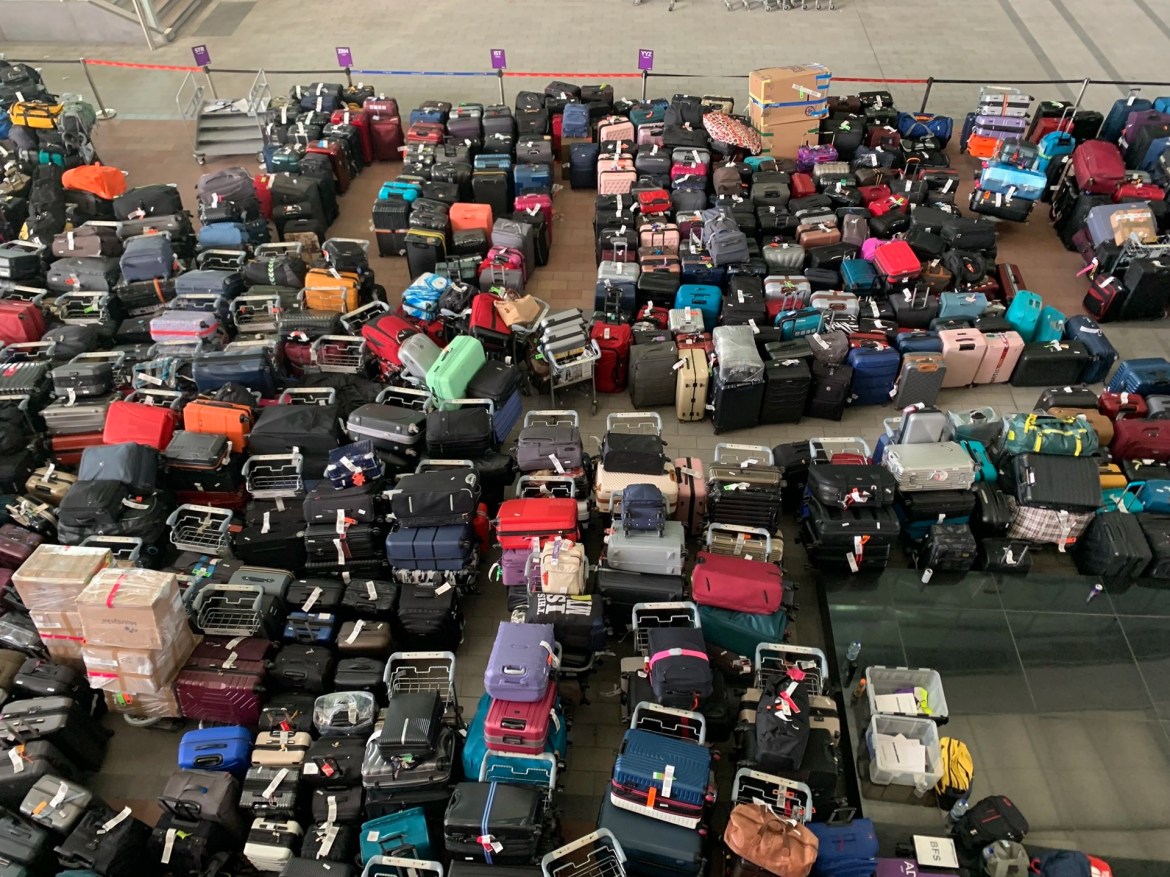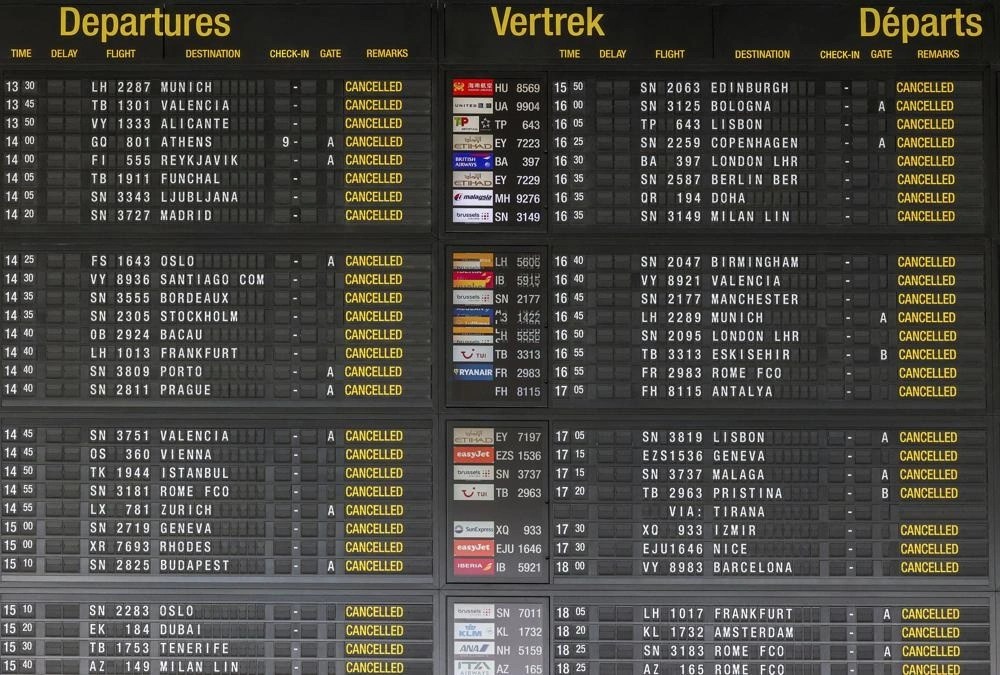In the first 6 months of the year, many airports around the world were constantly overloaded, flights were continuously delayed and canceled. This situation gets worse in the summer.
According to data from the US Bureau of Transportation Statistics, in the first six months of this year, more than 80,000 domestic flights in the country were canceled. This number is more than in 2019, the time before the pandemic. Flights canceled in the first half of this year were mostly by the nation’s busiest airline, Afar reported.
The service is overloaded, many airlines constantly receive complaints from passengers. According to statistics from the US Department of Transportation, air service complaints involve refunds, cancellations, delays and problems with schedule changes.
In Europe, overcrowding at major airports occurs consecutively during the peak tourist season. A series of airports such as Manchester (England), Dublin (Ireland) or Schiphol (Netherlands)… recorded the situation of long queues of people waiting in line for procedures, suitcases piled up.
Long-lasting effects of the pandemic
Overcrowding incidents lasted throughout the first half of this year, right after the aviation industry was heavily affected by the Covid-19 blow for two years. It’s time for the industry to step back and face many challenges, Laurie Garrow, President of AGIFORS, a non-profit aeronautical research organization, told Afar.

Passengers waited in line for many hours at Schiphol Airport (Netherlands) in June. Photo: Peter Dejong.
Previously, in March 2020, global air travel demand seriously decreased by about 90-95%. Airlines that want to stay afloat are forced to minimize operating costs. At that time, many airlines stopped hiring, cutting off new pilots, cabin crew and ground staff until the situation returned to normal.
“The temporary suspension of recruitment and reduction of personnel means that when travel demand returns to normal as before the epidemic, airlines will fall into a shortage of personnel. Currently, many companies are struggling because of a shortage of staff while passenger demand is increasing,” said Ms. Garrow.
Shortages of ground staff and crew, and air traffic control are the reasons for the chaos at airports and the constant loss of luggage, the AGIFORS president said.
Flight exploitation despite lack of manpower
Many people ask why airlines are in crisis of resources, flights are still operated with dense frequency?
“Airlines’ plans and schedules have collapsed due to unexpected spikes in travel demand,” said Robert Mann, an analyst and airline consultant.
Ed Bastian, CEO of Delta Air Lines (USA) admitted that airlines had to bear a lot to make up for 2 years of losses due to the epidemic. Ambition for profit when travel demand is high while resource problems have not been resolved leading to overcrowding problems.

Luggage strewn at Heathrow Airport on June 18. Photo: Twitter.
Meanwhile, Scott Keyes, owner of Scott’s Cheap Flights (USA), said that when airlines saw the need to return, they used all available resources to exploit as many flights as possible.
“It’s hard to predict exactly how many flights won’t be sold because the airline is uncertain about the availability,” Scott argued.
In the post-pandemic recovery phase, airlines can only rely on ticket booking rates and increased travel demand to operate as many flights as possible. Profiting first is the premise to gradually recover from the shortage of resources, airline owner Scott’s Cheap Flights told Afar.
When will the overload stop?
Amid all the negative information about the aviation industry in the past time, some indicators show that the activities of airlines have shown positive signs after the first six months of the year were fierce.
Since July, the number of canceled flights in the US has dropped to just 1.6% of all scheduled flights, according to data from flight tracking service FlightAware. In June, this index was at 2.7%.

A series of flights to around the world have been canceled during the peak tourist season. Photo: A.P.
Airlines are also gradually finding solutions to the shortage of personnel. In June, American Airlines increased pilot salaries by more than 50% on crews that were understaffed.
Delta Air Lines (USA) also helps apprentice pilots quickly get full-time jobs. The airline said it will hire and train more than 2,400 pilots this year.
In fact, current pilots do not have a “huge” income as in the pre-pandemic period. Airlines are promoting cheap tickets to attract passengers. To do that, they have to cut the pilot’s salary somewhat. Crew benefits are also not as good as before, one pilot told Afar.
Despite difficulties in recruiting personnel, airline operators are still optimistic that the situation will be more stable in the coming months.
Mrs. Laurie Garrow expressed hope that from the end of summer, airlines will improve their performance to operate smoothly in the fall. The President of AGIFORS believes that 2022 is a memorable lesson for airlines to improve services better in the future.
Aviation analyst Mann says the overload problems will cool down soon. “I think 2023 will be better, but that’s not a consolation for those who have had to experience flight cancellations and delays last time,” he noted.
According to Mr. Scott Keyes, difficulties are still ahead and hope that travelers understand the crisis airlines are going through.
“We face three risks that could arise over the next 6-18 months. These are the challenges of limited capacity of the system, rising fuel prices and the ongoing global recession,” said the CEO of United Airlines.
@ Zing News
Related
Source: Vietnam Insider
